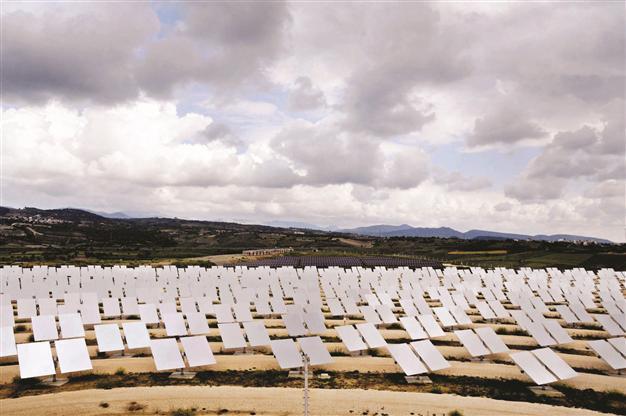First solar power plant race waters investors’ mouths
Merve Erdil ISTANBU - Hürriyet

Turkey aims to have 3,000 MW of installed solar power by 2023. This year, the Energy Market Regulatory Authority (EPDK) will approve licenses totaling 600 MW, but it has
received proposals for power totaling 9,000 MW. AA photo
Local and foreign energy investors are lined up to receive licenses to establish Turkey’s first solar power plant, with the electricity watchdog receiving applications from almost 500 companies with proposals for installed power totaling 9,000 megawatts. However, that figure is around 15 times higher than the institution’s limit.
The Energy Market Regulatory Authority (EPDK) received the long-awaited applications last week, kicking-off the Turkey’s solar power program.
Some 496 companies – including some of Turkey’s leading energy players such as Fiba, Enerjisa, Zorlu, Aksa, Çalık, Bereket, and Boydak, as well as Spanish, Italian, British and German companies - have applied to the EPDK with their projects within five days.
However, for 2013, EPDK will only give permission to 600 megawatts of solar power to be installed, which is just one-fifteenth of the total bids. Many investors in the sector question the quota, complaining about why there is a limit for solar power generation, while there is no such limit for coal and natural gas power facilities.
The high amount of applications poured to the EPDK also proves that the limit far from satisfies demand in the sector.
“If there wasn’t a 600 MW limit, a 100,000 MW bid would be laid,” a sector representative said, criticizing the government’s targets regarding the solar power for being too low.
Below capacity
The country, which is struggling to find sufficient energy sources to meet its growing economic and industrial needs, aims to have 3,000 MW of installed solar power by 2023.
“The target is already insufficient, but it also means that the solar power sector’s development will be slow for the next 10 years,” the representative said.
The World Bank has criticized Turkey for failing to utilize its renewable energy potential efficiently, as the government incentives to renewable energy came late and remain low.
The data of the bank, which has mobilized more than $1 billion in Turkey for renewable energy and energy efficiency projects, showed that Turkey currently utilizes just 5 percent of its projected total potential in this area. Despite the government saying it is mulling procurement of 30 percent of its power needs from these sources, the current regulations – laws and incentive schemes – and the awaiting projects prove the contrary. Currently, the government’s focus in its energy resources search is concentrated on three yet-to-be-built nuclear plants.
The construction of the first nuclear plant was handed to a Russian company, Rosatom, which plans to begin operations in Mersin-Akkuyu by 2019 and a second deal made with a Japanese-French consortium to build its second nuclear power plant in the Black Sea province of Sinop for $22 billion. Ankara also has been expressing its will to have a third plant, which is planned to be built and operated with more local involvement.
However, the boosts to Turkey’s nuclear program come at a time when questions over the safety of the industry are heightened after the Fukushima incident in Japan, which rocked the perception of the sector. Even though it’s more expensive in the short run, Germany has become the frontrunner by starting to shift its energy generation from nuclear to renewable energy.
